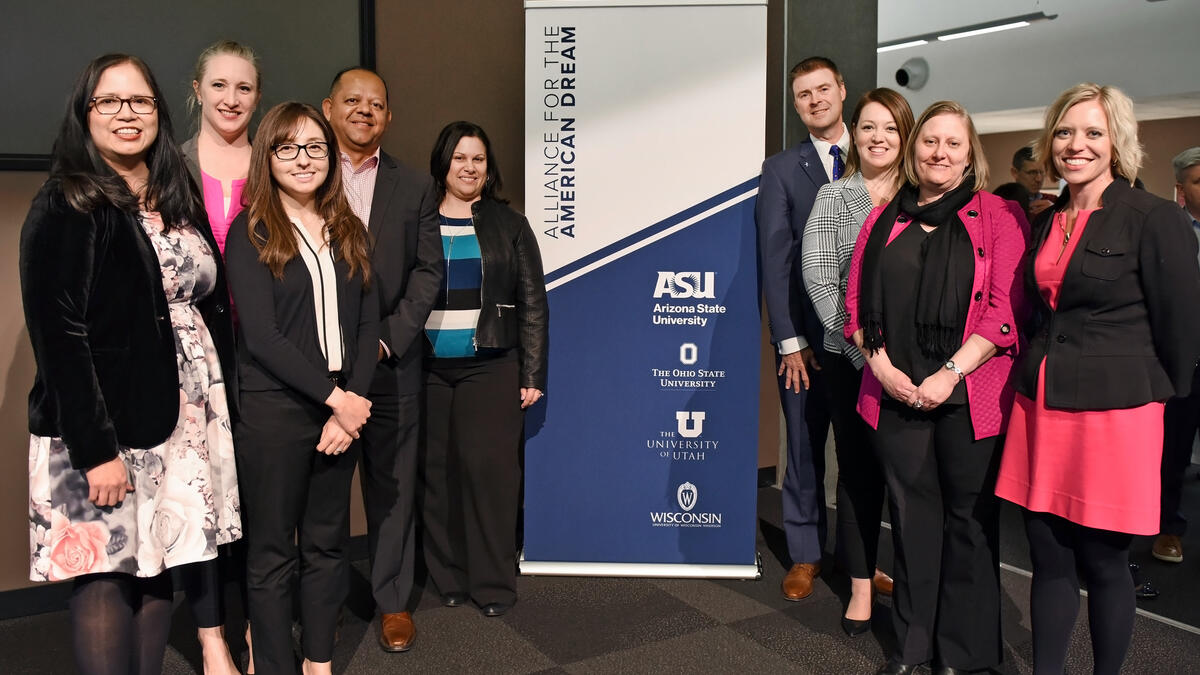ASU team advances to final round of Alliance for the American Dream competition

Members of The Power of FAFSA: Middle Class Wealth Generation team include (from left): Sylvia Symonds, Heidi Doxey, Julie Sainz, Edmundo Hidalgo, Grace Smith Kaus, Rich Nickel, Karla Robles, Melissa Pizzo and Rachel Yanof. Photo by Tim Trumble/Courtesy of the Alliance for the American Dream
On Jan. 29, the Alliance for the American Dream selected The Power of FAFSA: Middle Class Wealth Generation, a cross-sector team from Arizona State University focused on increasing access to federal financial aid for middle-class students and families, to move to the next round of competition.
Members of the Alliance of the American Dream convened in Phoenix for a pitch competition including 12 teams from four public universities — ASU, Ohio State University, University of Utah and University of Wisconsin-Madison — proposing ideas to raise by 10 percent the net income of 10,000 middle-class families in their communities by 2020.
A panel of experts from the public, private and nonprofit sectors selected five ideas to advance in the competition. This summer, teams will compete for up to $1 million of funding to implement their ideas. Advancing ideas were chosen for their interdisciplinary approach, technical components and focus on inclusion for diverse communities.
The team — which comprises College Success Arizona, Achieve60AZ, the Arizona Commission on Postsecondary Education, Helios, Mesa Public Schools, AzCAN and ASU's Educational Outreach and Student Services and Enrollment Services — plans to build on a nationally recognized, locally designed model for increasing successful completion of the Free Application for Federal Student Aid (FAFSA).
“This collaborative effort has elevated the partnership between our organizations and accelerated our work on behalf of Arizona students,” said Rich Nickel, president and CEO of College Success Arizona. “We are confident that this technology-enhanced solution will serve as an exemplar for the rest of the country.”
In addition to raising awareness, kickoff events, small-group support and one-on-one assistance, they will build a chatbot powered by conversational artificial intelligence to help a projected 10,000 more students and families complete the FAFSA and receive an average federal award of nearly $10,000 annually. If achieved, this would exceed the challenge goal and increase families’ net income by an estimated 16 percent.
“We know that 90 percent of high school seniors who complete a FAFSA go on to attend a postsecondary institution,” said Sylvia Symonds, associate vice president for educational outreach and student services and project lead. “Increasing FAFSA completion in Arizona will help increase the number of students and families who have access to higher education, building momentum toward our statewide 60 percent postsecondary attainment goal.”
The team seeks to make significant progress on a key educational goal in Arizona: raising the state’s FAFSA completion rate among high school seniors to 50 percent. If the team successfully reaches 10,000 new high school seniors, Arizona’s FAFSA completion rate would jump to 57 percent, a 14 percentage point increase in one year.
“By 2020, about 68 percent of all jobs in Arizona will require postsecondary education,” said ASU President Michael M. Crow. “The FAFSA team is seeking to help middle-class families prepare by opening different education pathways into universities, community colleges, trade schools and other institutions.”
ASU was also represented by two other teams, which included an intergenerational homesharing proposal seeking to help older homeowners rent out living space to college students in exchange for 10-20 hours per week of household maintenance tasks that become more challenging with age. The third team proposed to develop public-private partnerships that would leverage autonomous shuttles and ridesharing to provide low-cost mobility and transit services in Tempe and neighboring cities. While these teams will not pitch for $1 million, they each previously received $50,000 to support their project.
“We are extremely proud of all of the ASU teams who competed in response to Schmidt Futures’ audacious challenge,” said Jacqueline Smith, associate vice president for university initiatives at ASU. “The caliber of the teams’ ideas reflect the Valley’s collaborative and innovative culture.”
Other finalists included the Ohio State University’s proposal to support first-time homebuyers with the costly first years of homeownership, University of Utah’s proposal to support community revitalization in economically distressed coal-mining towns, and two proposals from University of Wisconsin-Madison for legal interventions and child care. The teams advancing to the finals were the top contenders from a process that resulted in hundreds of ideas from the four universities.
“At ASU alone, hundreds of individuals, including students, staff, faculty, community leaders, nonprofits, for-profits and governmental entities have participated in this work in the past eight months,” said Andrew Nelson, the ASU program manager responsible for the recruitment and preparation of teams for the national competition. “I witnessed firsthand that ASU teams really strive for excellence. Their commitment to continuous improvement of their implementation plans, pitches and supporting materials resulted in powerful ideas to enable shared prosperity.”
The Alliance for the American Dream is supported by Schmidt Futures, a philanthropic initiative founded by Eric and Wendy Schmidt that seeks to improve societal outcomes through the thoughtful development of emerging science and technologies that can benefit humanity.
Please direct all inquiries about ASU’s participation in the Alliance for the American Dream to Andrew Nelson, program manager – strategic network advancement: 480-727-3491 or nelson.andrew@asu.edu
More Arts, humanities and education

A humanities link from Harvard to ASU
Jeffrey Wilson didn’t specifically seek out Arizona State University professors when it came to filling out the advisory board…

ASU professor’s award-winning book allows her to launch scholarship for children of female shrimp traders in Mexico
When Arizona State University Associate Professor Maria Cruz-Torres set out to conduct the fieldwork for her third book, "Pink…

Herberger Institute Professor Liz Lerman to be honored as Dance Magazine Award winner
Dance Magazine has announced that Arizona State University Herberger Institute Professor Liz Lerman will be honored as a…